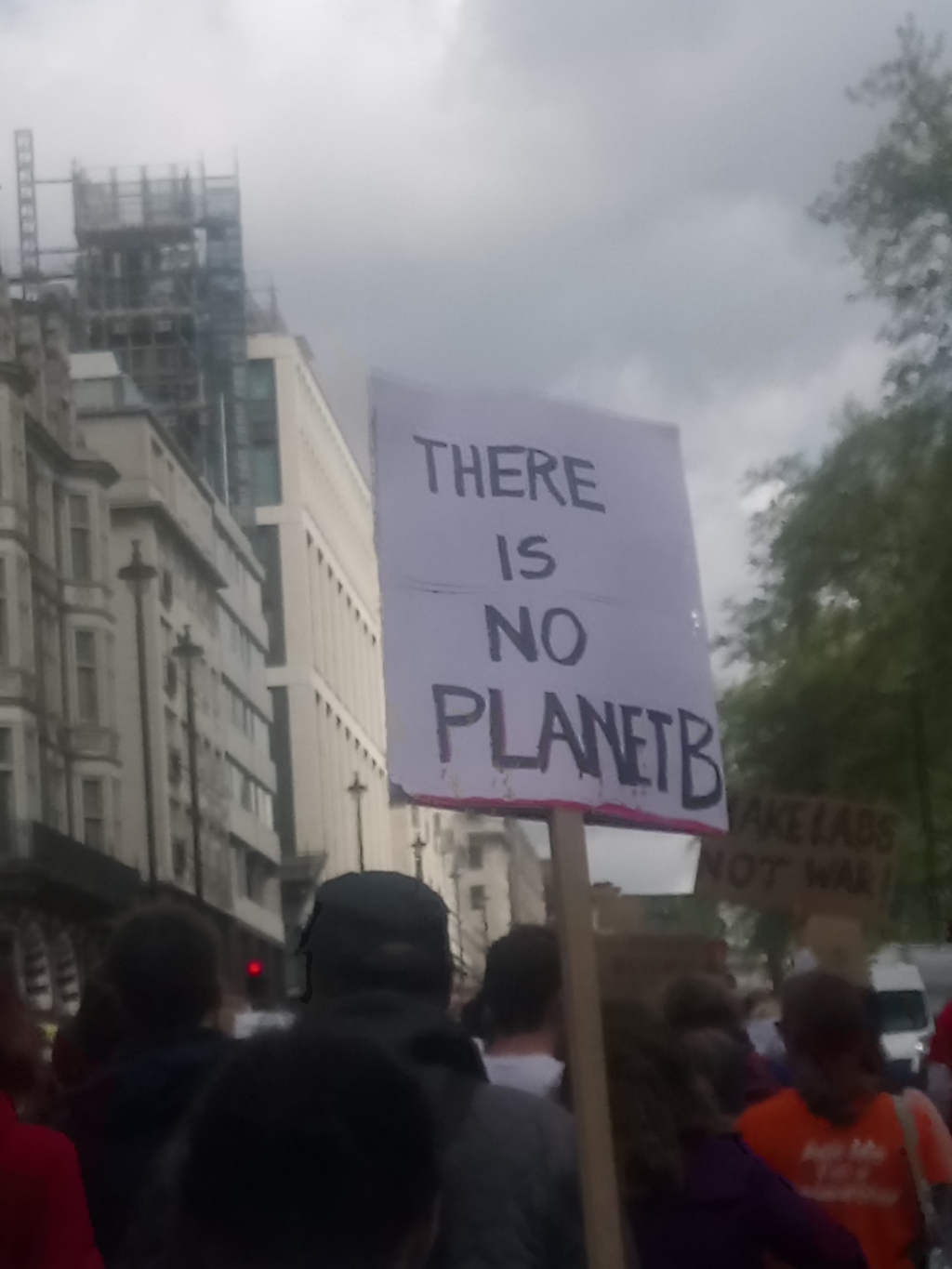Craftivism is getting attention. If there are issues that you feel you must speak out about, but taking to the streets with a placard fills you with dread, this may be for you. If you’re a crafter (or are prepared to buy the skills of a crafter) you may be able to influence people with crafted messages. Crafting though, in some ways, can be a subtle way to interest people in a greener, less resource-intensive lifestyle – one that is rooted in a more nature-based economy.
It was significant events in 2017 that turned my attention to this work. Events that, I’m sure, swayed many people’s attention and sparked the most remarkable debate on social media. It prompted me to add some thoughts on Craftivism and Activism. The inauguration of Donald Trump as President of the United States in January 2017 swayed my attention.
Crafting activities usually occupy much of my spare time, for my fingers are nearly always busy with yarn or fabric. At that time, though, when listening to the radio I found my fingers suspended, mid-movement whilst spinning wool. News came out about women taking to the street wearing handmade pink pussyhats.
Pussy Hats and the Women’s March
Whatever your views on politics and presidents, you probably didn’t miss the footage of crowds of women wearing these pink knitted hats, days after the inauguration of Donald Trump. What caught my attention, more than the politics, was that so many women picked up their knitting needles (or crochet hooks). Or, they bought a handmade hat, when normally they they would only buy from large fashion chain stores.
They turned heads and raised interest in crafters as activists. A thread of activism had already been infiltrating my own blogging for some time by then, but the way that they turned heads took me by surprise.
Craftivism is a broad church. There are many ways to combine activism with crafting. I intend not to divide, rather to suggest that there might be a spectrum.
Protest Craftivism
I’ve made this term up as I guess we’re more likely to think of craftivists as protesters. Suffragettes fighting for women’s suffrage and votes for women carried embroidered fabric banners on their marches. We now think of them as early craftivists. Today we know them for publicising social injustice by crafting pieces of artwork embroidered with, or incorporating, a message. Activist messages might appear somewhere unexpectedly, anonymously in the form of a banner, or might be in the form of hankies handed out with embroidered slogans.
Some bring attention to knitting as a craft by yarn bombing. Yarn bombing (or yarn graffiti) is also about brightening up dull and uninspiring spaces or street furniture and reclaiming them. Craftivists are also, in a way, reclaiming traditional feminine crafts, subverting them for the feminist cause. Betsy Greer coined the term craftivism in 2003, and with Sarah Corbett who started Craftivist Collective they’ve started a craftivist movement.
Everyday Craftivism
I’ve made this term up too, as I can’t think of a catchy alternative. I don’t think I tend towards protest craftivism. I just about have the time to make clothes and curtains for the house, so fitting in stitching slogans seems beyond me at the moment. Still, I believe this kind of functional crafting (or buying from a crafter or small local business) is a kind of activism.
I find myself inciting people into a little activism. I’m likely to suggest if you craft with yarn or fabric, buy wool. If you are British, buy #BritishWool. Don’t let that wonderful, renewable, biodegradable, warm and insulating yet breathable, natural, sustainable material go to waste. If possible, buy #rarebreedwool because those sheep represent thousands of years of farming heritage. Their life alongside people has created genetic diversity that we mustn’t lose, in a land where monoculture farming gains ever more ground. My local rare breed is Ryeland wool.
Although you may find yarn or readymade products made with rare breed wool hard to find, times are changing. Wool producers, textile crafters and other producers of wool products with a particular breed of sheep in mind appear every year. They make clothes, homeware, carpets and home insulation, for instance. I’ve listed some suppliers Herdwick and Swaledale Yarn: Local Cloth, Local Landscape.
Sheep and Protest
They are sheep with character, and I understand from my father-in-law, who ran a small farm for years, that they have personality too. Wool could come off the backs of sheep bleating in the fields on your doorstep. We don’t need to ship in this fabric on huge tankers over hundreds or thousands of miles from the other side of the planet. Yet, unfortunately, we compost or burn sheep fleeces year after year in the face of limited demand. Instead we choose non-biodegradable synthetic fibres made from oil, from who knows where.
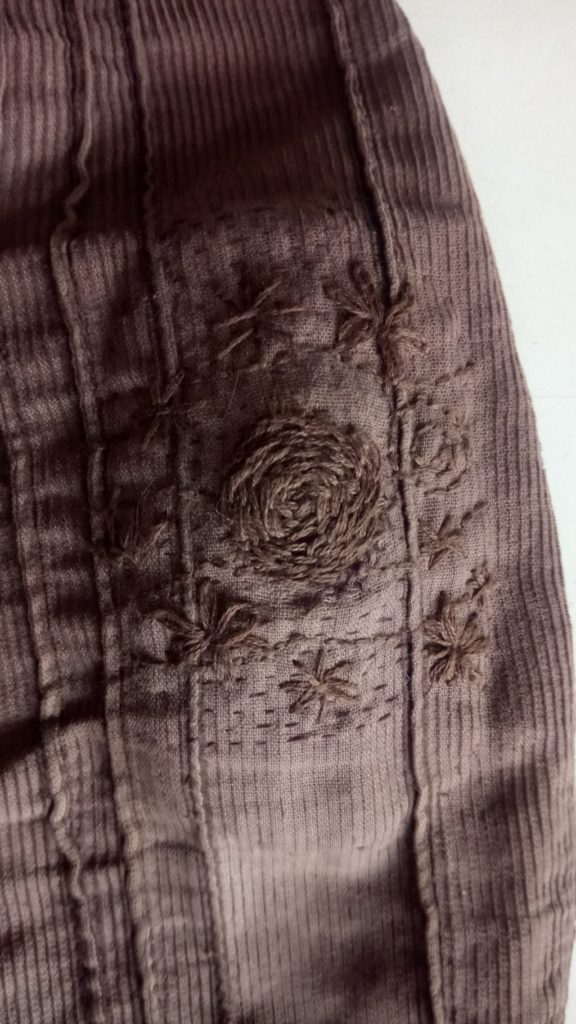
Craftivism and Slow Fashion
If you can, darn, stitch, get creative with #makedoandmend. Save good clothing from becoming landfill. Refuse to consume more than you need to. Make, create and produce, because along with the love of making, you get to take back a little bit of your life. A life dominated by mega-industry and big corporations. Support other makers too, in a bid for #sustainablefashion. Maybe the problems we’re causing by buying fast fashion, aired so much in the media lately, will inspire you to find the motivation to mend. Mend and re-mend: add your personal stamp to your clothing.
Subtle craftivism
You might find that others notice an interesting creative darn in your clothes and ask you about it. It’s your opportunity to say something about why you mend (or take your clothes to a repairer) rather than automatically buying new. It’s a way of being craftivist, but letting people come to you.
I’ve mentioned that I’d like to knit some leggings as part of a lycra and plastic fibre-free sports kit, because sportswear and activewear are the hardest clothes to find plastic-free. Now that I’ve got back to running again I’d like to turn up to a running race wearing pure, fine wool running kit. It would be my protest against plastic-fibre running wear. You can buy fine wool sportsware too.
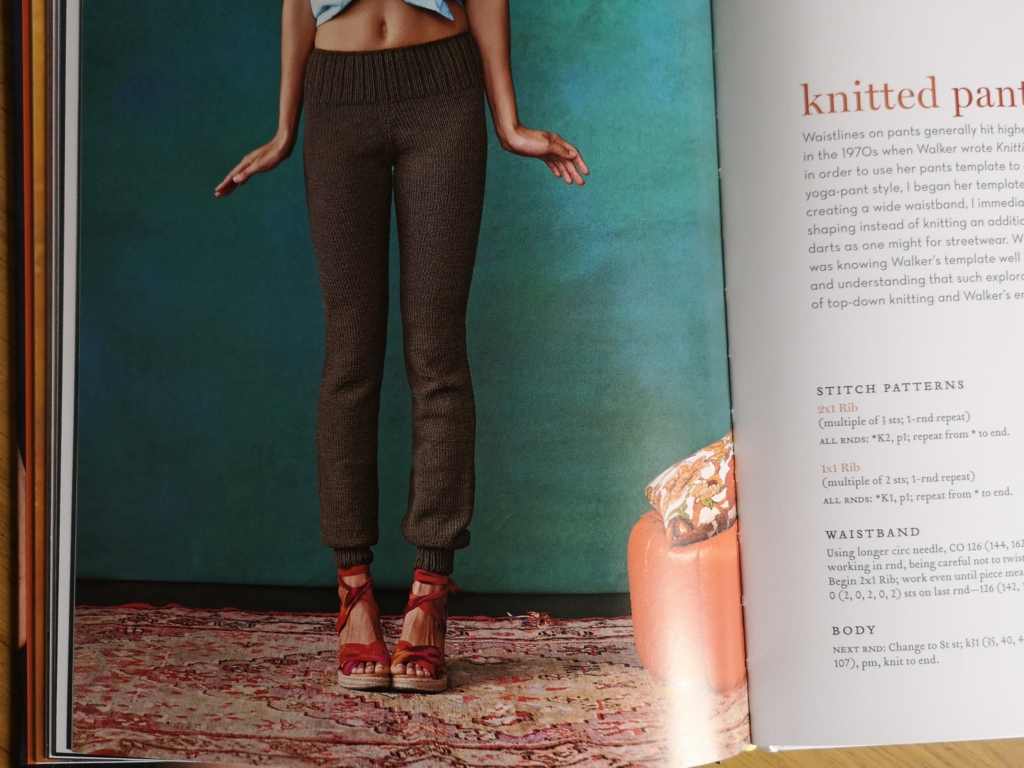
There, I’ve got on a roll, and I could go on. As I’m mainly a tea drinker I should stay off the coffee or the extra shot of caffeine will definitely make me go on.
An Activist in My Family
Sometimes I wonder where the tendency towards sporadic break-outs of tub-thumping comes from. In turn, I’m curious as to where it comes from in others that I follow. Is it nature or nurture? That question (nature or nurture) in my own case, has brought me round to some family history. It’s in the form of a letter which says something to me about history and activism repeating itself.
I used to think that I have no activist upbringing, that I don’t know where it comes from, and that it can’t be nurture. Maybe that’s not true though as my own dear father did quietly protest from time to time. Because he was unlikely to incite knitters to unite, though, I haven’t seen the connection.
A tendency to incite/protest goes back a generation too. I never got to know my Grandmother (my father’s side) as she died when I was two. She was fervently religious and a pacifist too.
The Suez Crisis
Some time ago, when searching through family documents, I found a copy of her own letter of protest which she’d addressed to Alderman Cyril Wilson Black about the Suez Crisis in November 1956. I found it alongside a petition, that I think is related. She addressed the latter to Anthony Eden, who I think was Prime Minister at the time. For a transcript of the rather blurry copy below, see below.
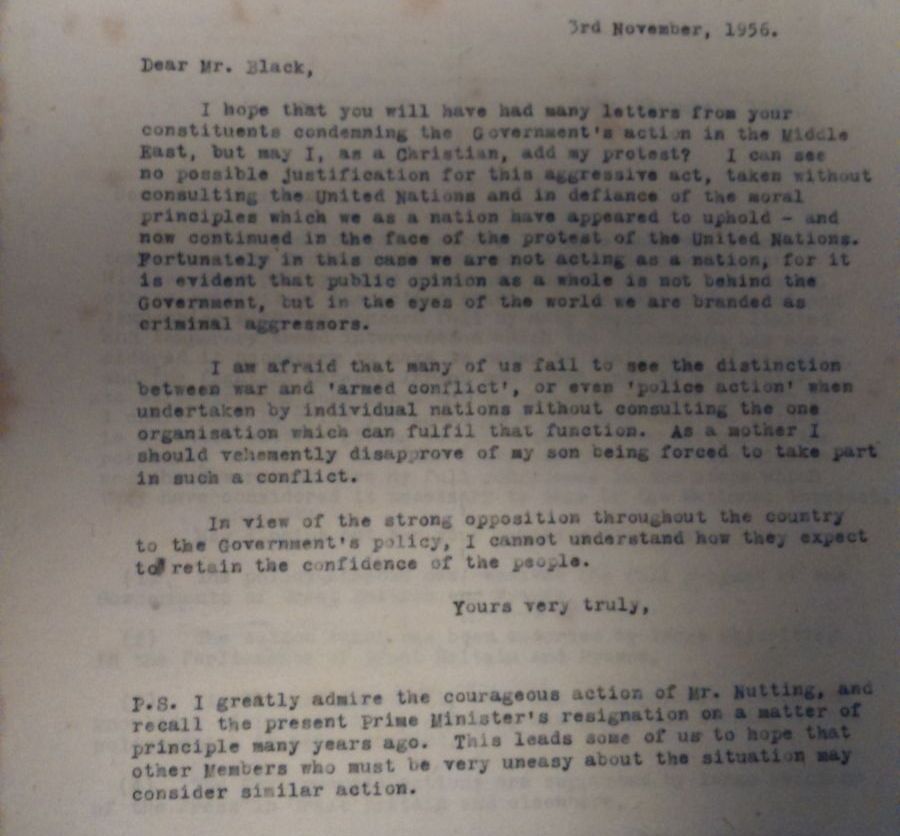
3rd November 1956
Dear Mr Black,
I hope that you will have had many letters from your constituents condemning the Government’s action in the Middle East, but may I, as a Christian, add my protest? I can see no possible justification for this aggressive act, taken without consulting the United Nations and in defiance of the moral principles which we as a nation appear to uphold – and now continued in the face of the protest of the United Nations. Fortunately in this case we are not acting as a nation, for it is evident that public opinion as a whole is not behind the Government, but in the eyes of the world we are branded as criminal aggressors.
I am afraid that many of us fail to see the distinction between war and ‘armed conflict’, or even ‘public action’ when undertaken by individual nations without consulting the one organisation which may fulfil that function. As a mother I should vehemently disapprove of my son being forced to take part in such a conflict.
In view of the strong opposition throughout the country to the Government’s policy, I cannot understand how they expect to retain the confidence of the people.
Your very truly,
P.S. I greatly admire the courageous action of Mr. Nutting, and recall the present Prime Minister’s resignation on a matter of principle many years ago. This leads some of us to hope that other Members who must be very uneasy about the situation may consider similar action.
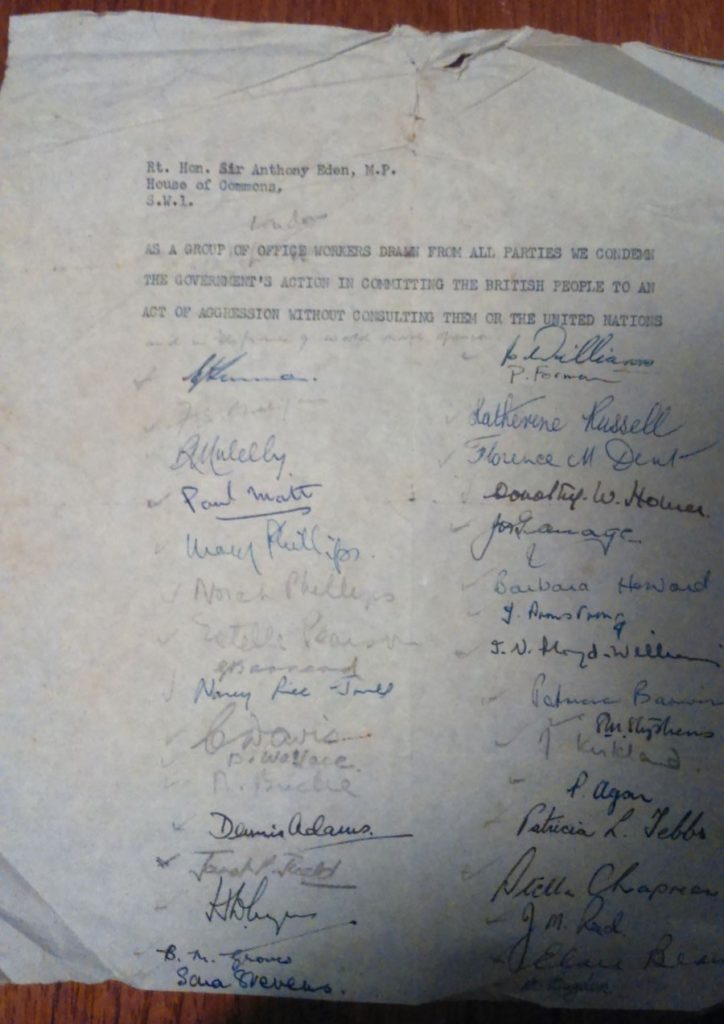
Does it sound familiar? Do we see history repeating itself today? The Iraq war? The migrant crisis affecting Mediterranean sea crossings from the North African cost to Europe during 2017/18?
Is activism nature of nurture?
These days I sign many digital petitions to ban bee-killing pesticides, for instance. Or to stop big banks and corporations from funding the destruction of rainforests and the demise of orangutans. My interests differ somewhat from those of my Grandmother. All the same, though, I wonder if I’m a ‘chip off the old block’ and if blood runs thicker than water? It can’t have been nurture, unless she was whispering activist thoughts into my toddler ears, for she never made it long enough for me to have a conversation with her.
Conversely, my other Grandmother (Nan), who I did grow up with, wouldn’t have petitioned and campaigned. Her everyday life was knitting, sewing, mending embroidering, cooking, baking. Perhaps I’m a chip off two blocks, and hence two opposite ways have merged?
Leah Chase and the Civil Rights movement
I started this post on Sunday, but broke off to travel out for a family get together. On the car radio the BBC Radio 4 Food Programme came on, and this time it was about Leah Chase: The cook who changed America. She is a 94 year old cook who recounted her days at Dooky Chase, her family restaurant in New Orleans. It became a favourite haunt of Civil Rights activists and Freedom Riders in the early 1960s, fighting for the end of racial segregation.
These people were living a dangerous lifestyle in order to fight for their cause. When asked if she worried about what would happen to some of these people, she said ‘…back then, in those days, we kinda thought a little bit more positive than we are thinking today. Today we don’t think positive, we just give up too soon, and we don’t realise if we just hang in there and do what ever we have to do, it’s going to be alright, it’s going to be alright. I always say we changed the course of America over a bowl of Gumbo [stew]….’.
Inspirational words. When you feel that Presidents, Prime Ministers, powerful global think tanks and large corporations are just too big to fight, perhaps we should bear Leah’s words in mind. Do what ever you have to do. Whether that be writing protest letters, signing petitions or little acts of defiance, like refusing to support large international corporations. Making stuff not buying stuff. Whatever makes sense to you. Just don’t lie down. No action will get us nowhere.
So, if in the face of bad news, all can seem hopeless, what do we do? Take a leaf out of Leah Chase’s book. Don’t lie down. Do what ever you have to do. Informe yourself though, I would say. There is a lot of conflicting advice, so we need to think through which solutions we want to back with our crafting endeavours. Act, but be informed – look outside of corporate-owned mainstream media.
